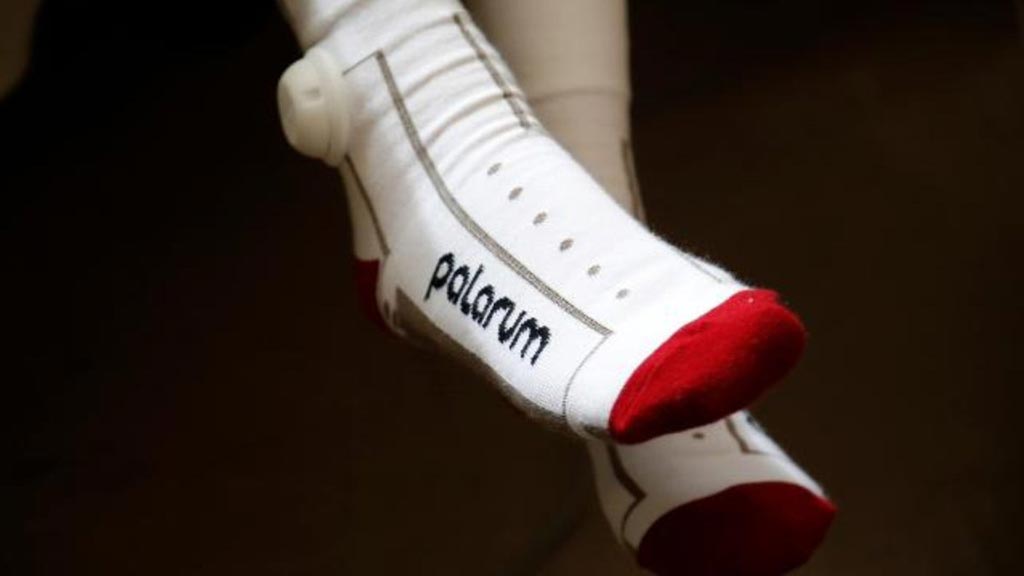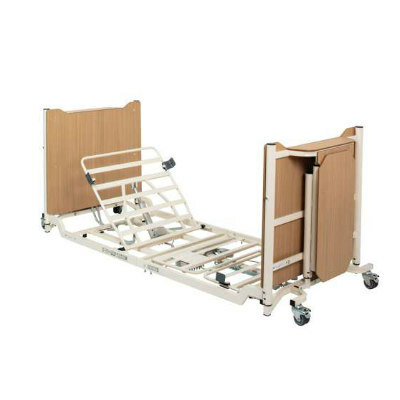Innovative Socks Reduce Fall Incidents and Accidents
|
By HospiMedica International staff writers Posted on 15 Mar 2018 |

Image: The smart socks help nurses know when a patient is out of bed (Photo courtesy of Palarum).
A new fall-prevention system can significantly reduce hospital patient falls and decrease nurses alarm fatigue through a smart notification system.
The Palarum (Lebanon, OH, USA) battery-powered PUP socks are designed with eTextile fabric; embedded in their nylon threads are conductive metal particles and elastomers. When a patient is on foot and unattended, a Bluetooth “beacon” system notifies the three closest nurses via a proprietary PUP smart watch and tablet that a patient is out of bed, walking unassisted, and at risk of falling. In addition to preventing falls, PUP socks can aid rehabilitation, physical therapy, and long-term care facilities, which aim to improve patient mobility. The socks are reusable, and can undergo 80 washing machine cycles.
In an eight-month functionality and utility study of PUP, conducted at a 50-bed acute care hospital in Ohio in 2017, a greater than 90% reduction in patient falls was reported. Over the study period, the fall rate was 0.00/1,000 patient days (0 falls) when the PUP patient smart socks were used as an adjunct to current fall-prevention interventions. A comparable patient population, which used only existing fall-prevention interventions, experienced a fall rate of 4.51/1,000 patient days (11 falls) during the same time period.
“PUP is a superior approach to reducing patient falls among high-risk patients, improving patient safety, reducing costs associated with falls and related injuries, and enhancing the overall hospital experience for patients, their families, and caregivers,” said Patrick Baker, CEO of Palarum. “Based on this initial effectiveness study of PUP, we plan to conduct a group randomized interventional study in a major Midwest academic medical center beginning in the first quarter of 2018.”
According to the World Health Organization (WHO; Geneva, Switzerland), an elderly person is seen every 11 seconds in an emergency room after a fall, and up to 30% of people over 65 and 50% of those over 80 fall at least once a year. The result of a majority of these falls is a hip fracture, with about 60,000 elderly people dying every year as a result of falls.
Related Links:
Palarum
World Health Organization
The Palarum (Lebanon, OH, USA) battery-powered PUP socks are designed with eTextile fabric; embedded in their nylon threads are conductive metal particles and elastomers. When a patient is on foot and unattended, a Bluetooth “beacon” system notifies the three closest nurses via a proprietary PUP smart watch and tablet that a patient is out of bed, walking unassisted, and at risk of falling. In addition to preventing falls, PUP socks can aid rehabilitation, physical therapy, and long-term care facilities, which aim to improve patient mobility. The socks are reusable, and can undergo 80 washing machine cycles.
In an eight-month functionality and utility study of PUP, conducted at a 50-bed acute care hospital in Ohio in 2017, a greater than 90% reduction in patient falls was reported. Over the study period, the fall rate was 0.00/1,000 patient days (0 falls) when the PUP patient smart socks were used as an adjunct to current fall-prevention interventions. A comparable patient population, which used only existing fall-prevention interventions, experienced a fall rate of 4.51/1,000 patient days (11 falls) during the same time period.
“PUP is a superior approach to reducing patient falls among high-risk patients, improving patient safety, reducing costs associated with falls and related injuries, and enhancing the overall hospital experience for patients, their families, and caregivers,” said Patrick Baker, CEO of Palarum. “Based on this initial effectiveness study of PUP, we plan to conduct a group randomized interventional study in a major Midwest academic medical center beginning in the first quarter of 2018.”
According to the World Health Organization (WHO; Geneva, Switzerland), an elderly person is seen every 11 seconds in an emergency room after a fall, and up to 30% of people over 65 and 50% of those over 80 fall at least once a year. The result of a majority of these falls is a hip fracture, with about 60,000 elderly people dying every year as a result of falls.
Related Links:
Palarum
World Health Organization
Latest Patient Care News
- First-Of-Its-Kind Portable Germicidal Light Technology Disinfects High-Touch Clinical Surfaces in Seconds
- Surgical Capacity Optimization Solution Helps Hospitals Boost OR Utilization

- Game-Changing Innovation in Surgical Instrument Sterilization Significantly Improves OR Throughput
- Next Gen ICU Bed to Help Address Complex Critical Care Needs
- Groundbreaking AI-Powered UV-C Disinfection Technology Redefines Infection Control Landscape
- Clean Hospitals Can Reduce Antibiotic Resistance, Save Lives
- Smart Hospital Beds Improve Accuracy of Medical Diagnosis
- New Fast Endoscope Drying System Improves Productivity and Traceability
- World’s First Automated Endoscope Cleaner Fights Antimicrobial Resistance
- Portable High-Capacity Digital Stretcher Scales Provide Precision Weighing for Patients in ER
- Portable Clinical Scale with Remote Indicator Allows for Flexible Patient Weighing Use
- Innovative and Highly Customizable Medical Carts Offer Unlimited Configuration Possibilities
- Biomolecular Wound Healing Film Adheres to Sensitive Tissue and Releases Active Ingredients
- Wearable Health Tech Could Measure Gases Released From Skin to Monitor Metabolic Diseases
- Wearable Cardioverter Defibrillator System Protects Patients at Risk of Sudden Cardiac Arrest
- World's First AI-Ready Infrasound Stethoscope Listens to Bodily Sounds Not Audible to Human Ear
Channels
Artificial Intelligence
view channel
AI-Powered Algorithm to Revolutionize Detection of Atrial Fibrillation
Atrial fibrillation (AFib), a condition characterized by an irregular and often rapid heart rate, is linked to increased risks of stroke and heart failure. This is because the irregular heartbeat in AFib... Read more
AI Diagnostic Tool Accurately Detects Valvular Disorders Often Missed by Doctors
Doctors generally use stethoscopes to listen for the characteristic lub-dub sounds made by heart valves opening and closing. They also listen for less prominent sounds that indicate problems with these valves.... Read moreCritical Care
view channel
Powerful AI Risk Assessment Tool Predicts Outcomes in Heart Failure Patients
Heart failure is a serious condition where the heart cannot pump sufficient blood to meet the body's needs, leading to symptoms like fatigue, weakness, and swelling in the legs and feet, and it can ultimately... Read more
Peptide-Based Hydrogels Repair Damaged Organs and Tissues On-The-Spot
Scientists have ingeniously combined biomedical expertise with nature-inspired engineering to develop a jelly-like material that holds significant promise for immediate repairs to a wide variety of damaged... Read more
One-Hour Endoscopic Procedure Could Eliminate Need for Insulin for Type 2 Diabetes
Over 37 million Americans are diagnosed with diabetes, and more than 90% of these cases are Type 2 diabetes. This form of diabetes is most commonly seen in individuals over 45, though an increasing number... Read moreSurgical Techniques
view channel
Miniaturized Ultrasonic Scalpel Enables Faster and Safer Robotic-Assisted Surgery
Robot-assisted surgery (RAS) has gained significant popularity in recent years and is now extensively used across various surgical fields such as urology, gynecology, and cardiology. These surgeries, performed... Read moreAI Assisted Reading Tool for Small Bowel Video Capsule Endoscopy Detects More Lesions
A revolutionary artificial intelligence (AI) technology that has proven faster and more accurate in diagnosing small bowel bleeding could transform gastrointestinal medicine. AnX Robotica (Plano, TX,... Read more
First-Ever Contact Force Pulsed Field Ablation System to Transform Treatment of Ventricular Arrhythmias
It is estimated that over 6 million patients in the US and Europe are affected by ventricular arrhythmias, which include conditions such as ventricular tachycardia (VT) and premature ventricular contractions (PVCs).... Read more
Caterpillar Robot with Built-In Steering System Crawls Easily Through Loops and Bends
Soft robots often face challenges in being guided effectively because adding steering mechanisms typically reduces their flexibility by increasing rigidity. Now, a team of engineers has combined ancient... Read moreHealth IT
view channel
Machine Learning Model Improves Mortality Risk Prediction for Cardiac Surgery Patients
Machine learning algorithms have been deployed to create predictive models in various medical fields, with some demonstrating improved outcomes compared to their standard-of-care counterparts.... Read more
Strategic Collaboration to Develop and Integrate Generative AI into Healthcare
Top industry experts have underscored the immediate requirement for healthcare systems and hospitals to respond to severe cost and margin pressures. Close to half of U.S. hospitals ended 2022 in the red... Read more
AI-Enabled Operating Rooms Solution Helps Hospitals Maximize Utilization and Unlock Capacity
For healthcare organizations, optimizing operating room (OR) utilization during prime time hours is a complex challenge. Surgeons and clinics face difficulties in finding available slots for booking cases,... Read more
AI Predicts Pancreatic Cancer Three Years before Diagnosis from Patients’ Medical Records
Screening for common cancers like breast, cervix, and prostate cancer relies on relatively simple and highly effective techniques, such as mammograms, Pap smears, and blood tests. These methods have revolutionized... Read morePoint of Care
view channel
Critical Bleeding Management System to Help Hospitals Further Standardize Viscoelastic Testing
Surgical procedures are often accompanied by significant blood loss and the subsequent high likelihood of the need for allogeneic blood transfusions. These transfusions, while critical, are linked to various... Read more
Point of Care HIV Test Enables Early Infection Diagnosis for Infants
Early diagnosis and initiation of treatment are crucial for the survival of infants infected with HIV (human immunodeficiency virus). Without treatment, approximately 50% of infants who acquire HIV during... Read more
Whole Blood Rapid Test Aids Assessment of Concussion at Patient's Bedside
In the United States annually, approximately five million individuals seek emergency department care for traumatic brain injuries (TBIs), yet over half of those suspecting a concussion may never get it checked.... Read more
New Generation Glucose Hospital Meter System Ensures Accurate, Interference-Free and Safe Use
A new generation glucose hospital meter system now comes with several features that make hospital glucose testing easier and more secure while continuing to offer accuracy, freedom from interference, and... Read moreBusiness
view channel
Johnson & Johnson Acquires Cardiovascular Medical Device Company Shockwave Medical
Johnson & Johnson (New Brunswick, N.J., USA) and Shockwave Medical (Santa Clara, CA, USA) have entered into a definitive agreement under which Johnson & Johnson will acquire all of Shockwave’s... Read more













